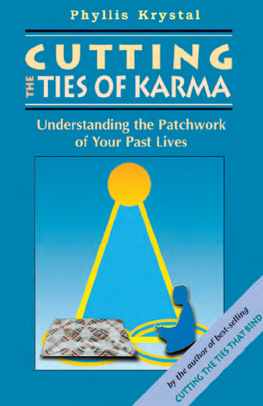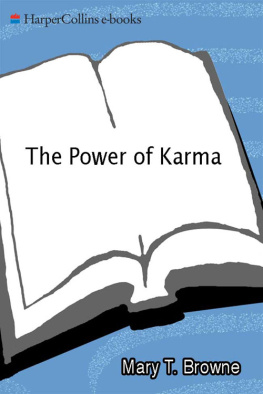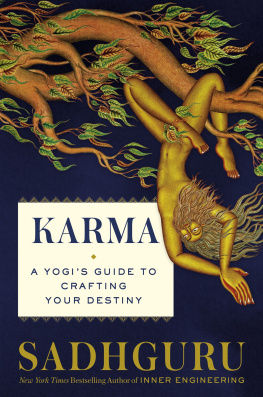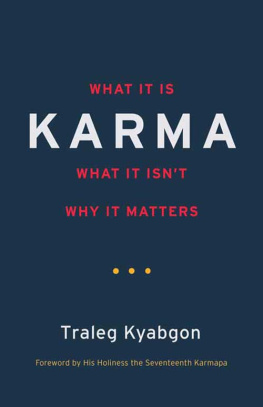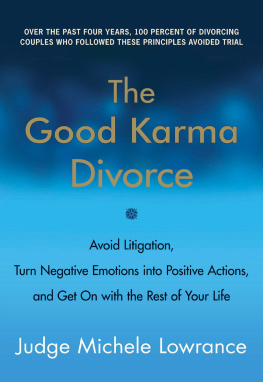Table of Contents
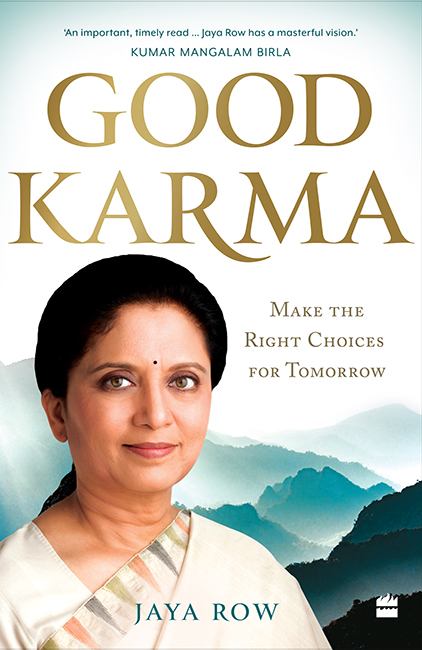

To the Gurus
Contents

T he world has been facing an unprecedented challenge since the beginning of 2020. Uncertainty is all around us. It is when life throws a curveball at you that you wonder do things happen randomly? Is life like a game of roulette or is there a method in the madness? Are we completely powerless, mere victims of fate, or do we have some say in determining lifes course? Do we have any control over what is happening around us and to us? It seems as if not everything is under our control. Yet, we are not entirely powerless. As a thinker said, We cannot always choose the music life plays for us but we can choose how we dance to it. In this lies our hope.
The word karma is often used loosely, without understanding its depth. People dismiss incidents that occur in their lives as my karma, suggesting that it is just their bad luck. It indicates helplessness and lack of power. Karma is anything but a passive submission to fate.
The ancient Indian sages have left an impressive body of study and research done on the subject of karma. It is exhaustive, systematic and complete. It is based on scientific data they collected and analysed, connecting seemingly unconnected facts and arriving at irrefutable conclusions. They discovered the Law of Karma. The source is in the Upanishads, the last portion of each of the Vedas. Great thinkers down the ages investigated independently on the subject and arrived at the same conclusions. They explained how the law of cause and effect that operates in the external world also functions in the inner world of thought, attitude and intention that manifest as action.
Once you understand the law, you can use it to your advantage to achieve your purpose, your goal, in life. Things become clear. You realize that everything in life is a reflection of the choices you have made in the past. To bring about a more successful and happier result, you now have to make different choices. The power lies in you. You are not a puppet in the hands of an unknown entity. You have the power to create your own destiny. With this new-found confidence, you begin to sculpt a brilliant future for yourself.
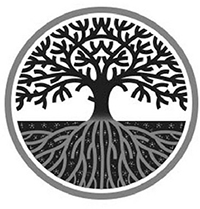

H uman suffering is one of lifes most compelling mysteries. Why does one person have a smooth journey through life, while another faces more than his share of problems? Why is one person born with a silver spoon in the mouth and another born in a slum? Is the Creator partial? Are we mere puppets in the hands of an unknown puppeteer? Or do we have the power to mould our own future? What governs the course of our lives? Is it fate? Are our life paths predetermined by a higher power? Or is there a thing called free will that we can use to chart our own course through life? These are some of the questions that baffle us.
Philosophers, thinkers and religious leaders have deliberated over fate versus free will for ages. The early Greeks thought that the inescapable destiny of each individual was preordained by supernatural powers known as gods. Later, philosophers like Plato and Aristotle brought a more rational view. The concept of free will was connected to moral responsibility. They felt that our actions depend more on us and are less predetermined by fate. However, the belief prevailed that the course of destiny is already charted out for the individual. Even if he chooses another alternative, he would meet with similar consequences in the long run. Modern thinkers are more inclined towards the idea of free will, but the debate continues to rage.
On the one hand, there are those who believe in fate. They believe that God has created the universe and is, therefore, responsible for all that happens in it. Everything that happens in everyones life is Gods will. Everyones life is written before birth, and there is nothing anyone can do to alter it.
On the other hand, there are those who believe in free will. They believe that each individual is entirely responsible for his own life and has the power to create his own destiny. There is no God and no such thing as luck. Then, of course, there are those in the middle. This group believes that our lives are a combination of fate and free will. The story below illustrates the saying God helps those who help themselves.
The Old Man and the Storm
An old man once had a dream that a storm would come and wipe away his village, but that God would protect him. As it happened, they had a terrible storm in the village the next day.
The old mans brother told him to leave the village as things were getting worse. He refused, saying God would protect him. On the second day, a neighbour came saying he was leaving with his family and offered to take the old man along. The old man declined because he was sure that God would protect him. On the third day, some people came on a boat and offered to take him to safety. Again, the old man refused, convinced that God would protect him.
Soon after, the man drowned and was taken to heaven. There, he asked God: Why didnt you help me as you had promised? God replied: I sent your brother, your neighbour and even a boat to take you to safety. You refused all three times!
The question remains: How do we fulfil our lifes purpose if we dont even know whether we are governed by fate or free will?
Fortunately, in ancient India, scientific thinkers focused on the inner world and discovered laws that govern our minds, in the same way that scientists discovered laws pertaining to the material world. If we understand these laws and abide by them, we can live happy, successful and fulfilled lives.

J ust as Newton wondered what made an apple fall down to earth and eventually discovered the law of gravity, ancient sages in India pondered over life and its various mysteries. They discovered the law of causation that every cause has an effect and every effect must have had a cause.
There are many laws that function in the inner world. Understand what they are and how they function, so you can use them to your advantage. One such law is the Law of Karma.
Christianity and Islam ascribe heaven as the fruit of good actions and hell as punishment for bad actions. In modern times, more people in the West have started believing in the Law of Karma in some way. Psychologists and psychiatrists are using past-life regression to help their patients recover from the effects of trauma from past lives. Dr Brian Weiss, a Columbia- and Yale-trained psychiatrist, has contributed immensely to the field of Past- Life Regression. He is called the Father of Modern Past-Life Regression. Dr Ian Stevenson, Dr Michael Newton and others are among the well-known practitioners who have written books based on their research.
The pre-Vedic masters may have understood the Law of Karma, but it was first documented and explained in the Upanishads. It is the very basis of the spiritual path that leads us from the mortal life of sorrow and suffering to the immortal state of infinite Bliss. The Brihadaranyaka Upanishad, the Shvetashvatara Upanishad and many others refer to the Law of Karma, which includes the theory of reincarnation. The Bhagavad Gita speaks of it in almost every chapter and explicitly explains the concept of reincarnation in Chapter 2, Verse 22, which says:


